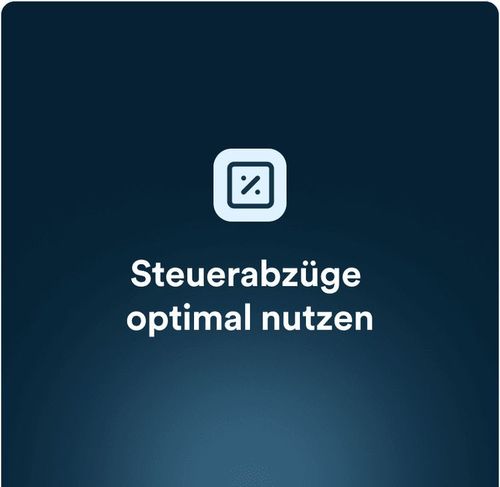The tax authorities offer individuals numerous opportunities to reduce their tax burden. By strategically utilizing deductions, taxpayers can lower their taxable income and, consequently, decrease the amount of taxes due. This page presents the most important deduction options available.
Use our tax calculator to find out how much you can save with these deduction options.
Simply upload your tax documents using our online tool and our experts will get the process started for you.

Pillar 3a is a private pension scheme that enables taxpayers to save for retirement while also benefiting from tax advantages. Contributions to pillar 3a can be deducted from taxable income up to a certain limit, resulting in a direct reduction of the overall tax burden.
For the year 2026, taxpayers who are insured in an occupational pension fund can contribute up to CHF 7,258 to pillar 3a and deduct this amount from taxable income. However, those not insured in an occupational pension fund are able to deduct a significantly higher amount of up to CHF 36,288. This deduction is particularly attractive, as it not only reduces the tax burden but also contributes to personal retirement savings.
CHF 7,258
CHF 36,288
Contributions to pillar 3a are beneficial in that the savings can grow tax-free until retirement. This means that returns on the contributions are not subject to tax until then. This provides a significant tax benefit and contributes to long-term wealth accumulation.
Work-related expenses can also be deducted from tax, reducing your overall tax burden. These include all expenses that are directly related to employment. The most common work-related deductions are commuting costs, expenses related to further education, meal allowances, and home office flat-rate deductions.
Anyone who relies on their own vehicle or uses public transportation for their commute to work can deduct commuting costs from taxable income. The deductible amount is based on the actual costs incurred for commuting. Both fuel expenses and costs for public transportation or a leased vehicle can be taken into account.
Due to the increase in remote work resulting from the pandemic or more flexible work arrangements, many taxpayers are eligible for a home-office flat-rate deduction. In Switzerland, under certain conditions, either a flat-rate amount or actual costs related to the home office can be deducted. This includes, among other items, a portion of rent, electricity, and internet costs that are incurred as a result of working from home.
Work-related further education expenses can also be deducted from taxes. This includes costs for courses, seminars, professional literature, and examination fees. However, these deductions are only allowed if the further education is directly related to the current or a future professional activity.
Sickness and health-related costs that are not covered by health insurance can be deducted from taxable income under certain conditions. This concerns both regular doctor's fees as well as costs related to alternative medicine or dental treatments.
Costs of dental treatments, surgeries, or other medical treatments not covered by health insurance can be deducted from taxable income. The deducted amount must be above a certain threshold, which may vary by canton. It's important to have all statements and invoices available when claiming such a deduction.
Many cantons allow parents to deduct external childcare costs from taxable income. This deduction is permitted for the care of children below the age of 14 by an external caregiver or a childcare facility. The permissible deduction varies by canton and is only granted under certain conditions.
Generally the costs of childcare by a nanny, kindergarten, or daycare can be deducted. This deduction is limited to the effective costs of care and is only granted if both parents work. Certain cantons also allow deductions for childcare during vacation time.
The amount of deduction and exact regulations differ by canton. It is recommended to check the specific guidelines of one's canton of residence to ensure that all deduction options have been used properly.
Call us or make an appointment online for a non-binding first conversation. We look forward to hearing from you.

